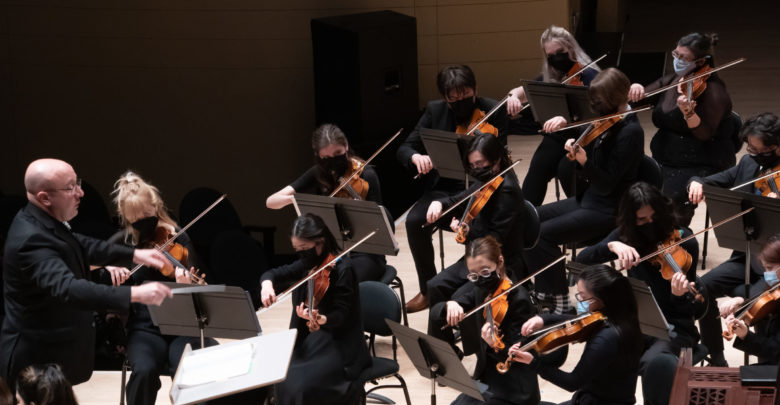‘Rekindle’ highlights music from the campus community
The largest musical collaboration since before the pandemic welcomes an incredible live experience, consisting of students and staff.
 Erik Visser
Erik VisserOn April 1, 2022, the University of Alberta department of music presented Rekindle, a concert in two parts featuring The University Symphony Orchestra, The Augustana Choir, Concert Choir, and Madrigal Singers at the Winspear Centre.
The concert began with the words “Let’s Rekindle this musical hearth,” which were impressive words for a beautiful performance.
Timothy Shantz, director of choral activities in the department of music at the U of A, described the title of the concert to be one that connects with the audience.
“The title of the concert, Rekindle, is more about rekindling our love for music-making and the audience’s love for listening to all this great music we’re making,” Shantz said. “So that’s the storyline you can say — we’re rekindling our relationship with hearing and making music.”
The first half was performed by the Symphony Orchestra and was supposed to be conducted by Petar Dundjerski, but due to contracting COVID-19, he was unable to attend. Angela Schroeder conducted the Dvorak portion of the first half, and Robert Uchida conducted in the Ravel.
The Symphony Orchestra highlighted the unique roles of each instrument in the performance, but audience members could tell how in sync each player was with each movement being matched by those beside them. Schroeder and Uchida not only led the players themselves, but also the audience through the show.
This was followed by a violin concerto with the winner of the concerto competition, Ehren Moser, a current member of the Chamber Orchestra of Edmonton and the U of A Symphony Orchestra, as a soloist. Her performance truly exhibited the “fireworks, energy, [and] passion” Shantz used to describe the first half of the concert.
Anyone could tell how invested Moser was in her performance, she would coordinate her breathing with her playing, measuring each breath accordingly, and once the remaining violins and instruments joined the performance, it became a truly remarkable live experience with each player playing simultaneously.
Moving to the second half, Shantz conducted a choir and orchestra for the piece written by Michael Haydn, brother of Austrian composer Joseph Haydn, said to be an inspiration for Mozart himself. Requiem in C minor was performed to honour the death of Haydn’s patron and infant daughter. This was the largest performance of the night and had staff members perform various solos: Miriam Khalil (Soprano), Lesley Dolman (Alto), John Tessier (Tenor), and Jin Yu (Baritone).
Each soloist’s performance seemed effortless, and with the instrumental background, the difference between each singer could be identified. Shantz conducted himself with exaggerated motions matching the music, determining the mood of the segment. The choir’s feedback made the piece seem like a conversation between leaders and their followers. It was visible how even the singers themselves were experiencing the music with head nods and smiles.
Shantz describes the second half as an honouring to the dead, but also bringing joy to listeners.
“It’s a bit contemplative — celebratory but also it’s a requiem, it’s honouring the dead; that’s what it was written for, but there’s a lot of joy in the piece,” Shantz said. “The second half … it does tell us a bit of a story; it takes us to darker places and then joyful places, and light and darkness combine.”
“I hope the audience hears music, has that live experience of music … the experience of seeing people make music, but also the pride in hearing the quality of what the students can offer. I know the audience will be inspired by that — be inspired by the student performers, especially in collaboration with faculty members.”
Shantz emphasized that in a time of uncertainty during the pandemic, being able to perform with an idea that was proposed last spring was important to the students and the staff.
“In January, the most difficult [part] was believing we could do it and sticking with it … but we believe music is needed,” Shantz said. “People need to hear it and need to [understand] the fact that we had over 120 performers on stage — I think [it] was a big achievement.”
“For our music students, it’s been a hard time during COVID-19 for not always being able to perform in front of an audience, there’s a relationship there that is important. For us to perform and to have people listening and responding, that is going to be special for our performers, really special.”




